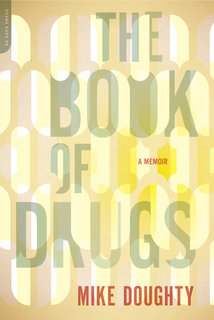The Book of Drugs
The Book of Drugs is a memoir by Mike Doughty, the lead singer of the alternative rock band Soul Coughing. Published in 2012, the book details Doughty's struggles with addiction, his tumultuous relationship with his bandmates, and his journey towards recovery. It provides a candid and often stark look at the realities of fame, the pressures of the music industry, and the destructive power of drugs. The narrative not only explores Doughty's personal demons and experiences but also offers insights into the dynamics of Soul Coughing, shedding light on the conflicts and challenges that ultimately led to the band's breakup.
Summary[edit | edit source]
The Book of Drugs narrates Mike Doughty's early life, his formation of Soul Coughing in the early 1990s, and the band's rise to fame. Doughty discusses the creative process behind some of the band's most popular songs and albums, such as Ruby Vroom, Irresistible Bliss, and El Oso. However, the core of the book delves into Doughty's addiction to heroin and alcohol, which escalated as the band's success grew. He describes the isolation and despair he felt, even as he performed in front of thousands of fans. The memoir is brutally honest about the impact of addiction on Doughty's relationships, health, and career.
Themes[edit | edit source]
The book touches on several themes, including the allure and pitfalls of fame, the creative process, and the struggle for authenticity in an industry often driven by commercial interests. It also addresses the complex dynamics within bands, the challenge of maintaining personal integrity, and the journey towards sobriety and redemption.
Reception[edit | edit source]
The Book of Drugs received critical acclaim for its unflinching honesty and engaging narrative style. Critics praised Doughty for his willingness to expose his vulnerabilities and for providing a sobering look at the consequences of addiction. The memoir was noted for its insightful commentary on the music industry and its exploration of the human condition.
Impact[edit | edit source]
The memoir has been recognized for its contribution to discussions about addiction and recovery, particularly within the context of the music industry. It has served as a source of inspiration for individuals struggling with similar issues, offering hope and a path towards healing.
Search WikiMD
Ad.Tired of being Overweight? Try W8MD's physician weight loss program.
Semaglutide (Ozempic / Wegovy and Tirzepatide (Mounjaro / Zepbound) available.
Advertise on WikiMD
|
WikiMD's Wellness Encyclopedia |
| Let Food Be Thy Medicine Medicine Thy Food - Hippocrates |
Translate this page: - East Asian
中文,
日本,
한국어,
South Asian
हिन्दी,
தமிழ்,
తెలుగు,
Urdu,
ಕನ್ನಡ,
Southeast Asian
Indonesian,
Vietnamese,
Thai,
မြန်မာဘာသာ,
বাংলা
European
español,
Deutsch,
français,
Greek,
português do Brasil,
polski,
română,
русский,
Nederlands,
norsk,
svenska,
suomi,
Italian
Middle Eastern & African
عربى,
Turkish,
Persian,
Hebrew,
Afrikaans,
isiZulu,
Kiswahili,
Other
Bulgarian,
Hungarian,
Czech,
Swedish,
മലയാളം,
मराठी,
ਪੰਜਾਬੀ,
ગુજરાતી,
Portuguese,
Ukrainian
Medical Disclaimer: WikiMD is not a substitute for professional medical advice. The information on WikiMD is provided as an information resource only, may be incorrect, outdated or misleading, and is not to be used or relied on for any diagnostic or treatment purposes. Please consult your health care provider before making any healthcare decisions or for guidance about a specific medical condition. WikiMD expressly disclaims responsibility, and shall have no liability, for any damages, loss, injury, or liability whatsoever suffered as a result of your reliance on the information contained in this site. By visiting this site you agree to the foregoing terms and conditions, which may from time to time be changed or supplemented by WikiMD. If you do not agree to the foregoing terms and conditions, you should not enter or use this site. See full disclaimer.
Credits:Most images are courtesy of Wikimedia commons, and templates Wikipedia, licensed under CC BY SA or similar.
Contributors: Prab R. Tumpati, MD

